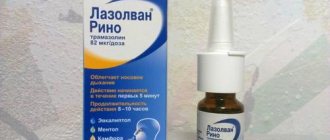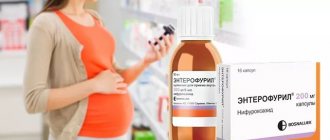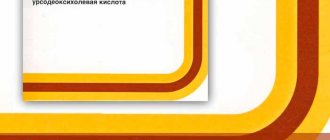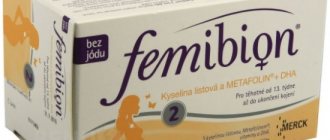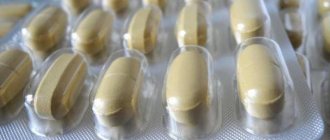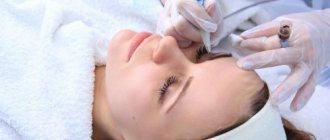A runny nose during pregnancy can be caused by allergies, hormonal changes or an infectious disease, and nasal congestion prevents full breathing and causes significant discomfort. One of the popular drugs that can quickly ease breathing when you have a runny nose is Snoop spray. Let's figure out whether it can be used while pregnant.
- 2 Use of Snoop during pregnancy
2.1 Use of the drug at different stages of gestation
- 2.2 If Snoop is needed
- 4.1 Table: Snoop analogues allowed during pregnancy
4.1.1 Photo gallery: Snoop analogues
Composition and effect of the drug
Having opened the instructions for the drug, you should carefully read its composition, action, contraindications, and recommendations for use.
The drug Snoop is a clear liquid. There are two forms of the medicine: drops and spray. The main active ingredient is xylometazoline hydrochloride . It also contains additional substances - sea water and potassium dihydrogen phosphate.
The main effect of the drug is a vasoconstrictor . Literally a few minutes after injection or instillation, the swelling of the nasal passages subsides. According to the label on the package, it becomes clear that absorption into plasma is at a minimum level.
How to replace the drug
Analogues of Snoop can be vasoconstrictors containing another active ingredient:
- with phenylephrine (Vibrocil, Polydexa, Rinza);
- with oxymetazoline (Nazvin, Afrin, Nazol);
- with naphazoline (Naphthyzin, Sanorin)
However, all of these drugs have a vasoconstrictor effect and, like Snoop, are not recommended for pregnant women. To treat a runny nose, expectant mothers are officially allowed to use only preparations based on sea water, which help cleanse the nasal sinuses, moisturize the mucous membrane, and stimulate local immunity.
Recent Entries
Is it possible to give a mirror: how to protect yourself from bad omens It became known about the influence of cell phone towers on human health Is it possible to eat bananas bought in Russia?
Pregnancy-safe medications cannot relieve nasal congestion as quickly as vasoconstrictors
Table: Snoop analogues allowed during pregnancy
| Drug name | Release form | Active ingredients | Contraindications | Features of use during pregnancy |
| Aqualor |
| Sterile solution of sea water from the Atlantic Ocean. | Individual intolerance to the components of the drug. | Allowed for use during pregnancy. |
| Aqua Maris | Sterile hypertonic solution of Adriatic Sea water with natural salts and trace elements. | |||
| Humer | Sterile isotonic seawater solution. | |||
| Pinosol |
|
|
| There are no data on the safety of using the drug during pregnancy. Use is possible only as prescribed by a doctor. |
Photo gallery: Snoop analogues
The action of Pinosol is based on the oils it contains.
Contains sterile isotonic sea water, rich in microelements
Aqua Maris is available in the form of spray and drops
Aqualor has varieties that differ in the degree of concentration of the active substance
Snoop during pregnancy
Based on the above, we can conclude that this medicine can be used during pregnancy.
But after reading the instructions for the drug in detail and learning about its side effects, doubts arise. Adverse reactions can occur from various systems. On the part of the respiratory system: with frequent use, dryness, irritation, and burning occur. There may even be an allergic reaction of the body in the form of swelling of the nasal mucosa.
Also, the central nervous system may react in a unique way to the drug. Insomnia, headache, and visual acuity may . In rare cases, tachycardia and arterial hypertension appear. Sometimes vomiting may occur.
The instructions indicate that the use of the spray during pregnancy is unacceptable. In addition, it is important to know that Snoop must be used with caution when breastfeeding. But then it is not clear why doctors often prescribe Snoop during pregnancy. Maybe they don't know that this medicine is dangerous for the child?
Rhinitis during pregnancy
Pregnancy is a special period for a woman, when her body experiences enormous stress and works in an intense mode, which leads to a decrease in immunity. In addition, an excess of hormones in a pregnant woman’s body causes swelling and nasal congestion – rhinitis.
Rhinitis is inflammation and swelling of the tissues of the nasal passages, which is accompanied by discharge. Most often, pregnant women experience allergic rhinitis. This is how the expectant mother’s body reacts to various external stimuli. A runny nose does not allow a woman to breathe calmly, her sleep is disturbed, and her health worsens. The unborn baby also suffers from a lack of oxygen due to difficulty breathing. Therefore, it is necessary to treat rhinitis for pregnant women. Before starting treatment for a runny nose, you should find out the cause of its origin:
- Viral or bacterial rhinitis is one of the striking symptoms of acute respiratory disease or influenza. Accompanied by sneezing, nasal discharge, cough and fever, general malaise and weakness.
- Vasomotor rhinitis. This type of rhinitis occurs in the first weeks of pregnancy and is associated with a sharp hormonal imbalance in the female body, which is preparing to bear a fetus.
- Allergic rhinitis. It occurs as a result of any external irritants and is manifested by nasal congestion and swelling of the tissues.
A doctor must establish an accurate diagnosis and find out the type of rhinitis in order to correctly prescribe effective treatment. Each type of rhinitis requires special treatment, which will determine the speed of recovery from the disease.
As a rule, vasoconstrictors in the form of drops or sprays are used to eliminate the unpleasant symptoms of rhinitis and improve breathing. However, not all medications are allowed during pregnancy. In most cases, for expectant mothers who suffer from rhinitis, the doctor prescribes Snoop during pregnancy to facilitate the patient’s breathing and normal oxygen supply to the fetus.
Let's try to figure it out
It is quite difficult for a pregnant woman to get rid of a runny nose.
Almost any vasoconstrictor has contraindications during pregnancy. And this can be explained. Since such drugs constrict blood vessels, less oxygen will flow to the child. In one-time cases these will be microdoses. But if the same Snoop is used for a long time, fetal hypoxia may occur. So what should we do? When treating pregnant women, Snoop can only be used as prescribed by a doctor . In this way, it will be possible to reduce the risks of using the medicine to a minimum so that they do not harm the child. The doctor will be able to determine what will be more unfavorable for the child: a runny nose and, as a consequence, oxygen deficiency with the stress of the mother. Or some slight nutritional deficiency.
If the pregnancy is proceeding normally, then in case of viral or bacterial etiology of the runny nose, Snoop will help alleviate the woman’s condition. Important: the use of the medicine is possible only for a short time. At the same time, constant analysis of what is happening to the body is necessary.
Snoop is best used before bedtime for up to 7 days. If you experience any unpleasant sensations similar to side effects from the drug, you should stop taking Snoop.
How to treat a runny nose in a pregnant woman
Snoop is an effective remedy for nasal congestion, but for women in delicate situations it is prescribed as a last resort, given that pregnancy is included in the list of contraindications. To cure an infectious runny nose without the risk of harming your baby, use the following recommendations:
- Ensure a comfortable microclimate in the house - maintain optimal humidity (50–60%) and temperature (about 20 degrees) in the room, regularly ventilate the rooms.
- Warm your nose from the outside by applying a heating pad or bags of heated sea salt.
- Blow your nose regularly.
- Rinse your nose with seawater solutions. These can be pharmaceutical preparations (Aqua Maris, Aqualor, etc.) or prepared independently (1 teaspoon of sea salt per glass of warm boiled water).
A runny nose may be just one of the symptoms of the disease; you should consult a doctor if your body temperature rises
The use of traditional medicine - inhalations, herbal infusions, reflexology during pregnancy may be prohibited. These treatments should be discussed with your doctor. When treating, it is important to find out the cause of the runny nose in order to select appropriate therapy. Thus, for allergic rhinitis, it may be necessary to take antihistamines, and for rhinitis in pregnant women, many standard medications may be ineffective.
Instructions for use of Snoop during pregnancy
A doctor may prescribe this drug only if breathing is too difficult and if the risk from a runny nose outweighs the possible risk to the child.
Snoop can be prescribed only when the doctor determines that its use will not negatively affect the process of bearing a child. The dosage of the drug according to the instructions is as follows: from 2 to 3 sprays or drops in both nostrils from 1 to 3 times a day, depending on the patient’s condition. The exact dosage for the use of the drug is determined by the doctor.
Treatment with Snoop can be prescribed in a situation where the pregnant woman has not been helped by other more gentle remedies based on herbs, sea water or essential oils, and breathing is too difficult.
Important! Snooping is strictly prohibited in the first trimester of pregnancy, since at this time the main organs and tissues of the child are formed.
Contraindications
- severe atherosclerosis ;
- cardiopalmus;
- individual hypersensitivity;
- arterial hypertension;
- atrophic rhinitis;
- glaucoma;
- carrying a pregnancy;
- thyrotoxicosis;
- a history of specialized surgical interventions on the meninges.
A 0.1% solution is not used in pediatric practice in children under 6 years of age, 0.05% - up to 2 years of age.
Relative contraindications (use with caution):
- diabetes;
- prostate hyperplasia;
- breast-feeding;
- angina pectoris (ischemia of the heart muscle).
Treatment with Snoop in childhood
It is worth knowing that Snoop can be used when treating children. However, there are some features that are important to remember. This spray is available in different concentrations:
- 0.05 (children). It should not be used for children under 2 years of age.
- 0.1% (adult). Strictly prohibited for children under 6 years of age.
The question arises: how, in this case, can Snoop cure the child?
Dosages for children:
- For a child aged 2–6 years , the instructions recommend one injection of a children's spray at a concentration of 0.05% into each nasal passage. The maximum number of applications per day is 3. As necessary, 2 injections can be administered into each nostril.
- Children 6 years of age and older are also recommended to take one injection, but the concentration of the solution should be different - 0.1%. Also, the maximum number of applications per day is 3 and repeating is recommended if necessary.
It is also important to observe the duration of treatment. According to the instructions, the maximum period of treatment with the drug is 5 – 7 days.
Indications for use
Spray Snoop is actively used in ENT practice to relieve negative symptoms in:
- hay fever;
- allergic rhinitis (acute form);
- Acute respiratory infection with symptoms of rhinitis;
- eustachitis;
- sinusitis;
- otitis media (to reduce swelling as part of combination therapy).
The drug can be prescribed before a diagnostic procedure such as rhinoscopy to facilitate the procedure and improve the patency of the nasal passages.
When is Snoop appointed?
Official indications for the use of the drug, prescribed in the annotation for the medicine, are conditions such as:
- acute respiratory infections occurring with severe runny nose;
- Acute rhinitis of allergic origin;
- Hay fever;
- Eustachitis or otitis of the middle ear to reduce hyperswelling of the mucous membranes;
- Sinusitis;
- Before diagnostic studies in the nasal passages, the organ cavities are treated with Snoop to facilitate manipulations, for example, rhinoscopy, etc.
When used topically, Snoop is almost not absorbed, therefore it is found in the bloodstream in scanty concentrations.
Snoop price, where to buy
For Snoop spray, the price can vary in the range of 100-150 rubles. Children's Snoop costs on average 135 rubles; nasal drops for adults – 125 rubles.
- Online pharmacies in RussiaRussia
- Online pharmacies in KazakhstanKazakhstan
ZdravCity
- Snoop nasal spray.
0.05% 15mlUrsapharm A. GmbH/Famar Health Care MSAU RUR 139 order - Snoop nasal spray. 0.1% 15mlHemomont d.o.o.
118 RUR order
Pharmacy Dialogue
- Snoop (spray 0.05% 15ml)Stada Arzneimittel
146 RUR order
- Snoop 0.1% spray 15mlStada Arzneimittel
115 rub. order
Europharm* 4% discount using promo code medside11
- Snoop nasal spray 0.1% 15 mlStada/Famar Health Care Services
124 RUR order
- Snoop nasal spray 0.05% 15 mlStada/Famar Health Care Services
147 RUR order
show more

